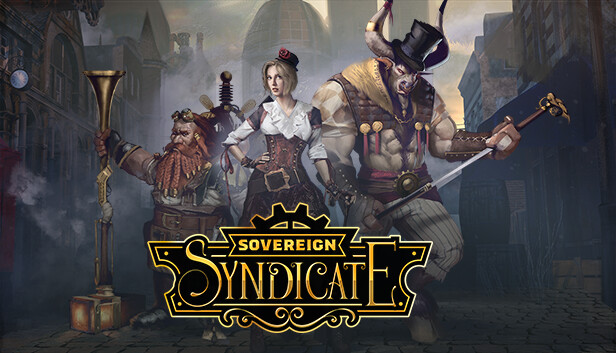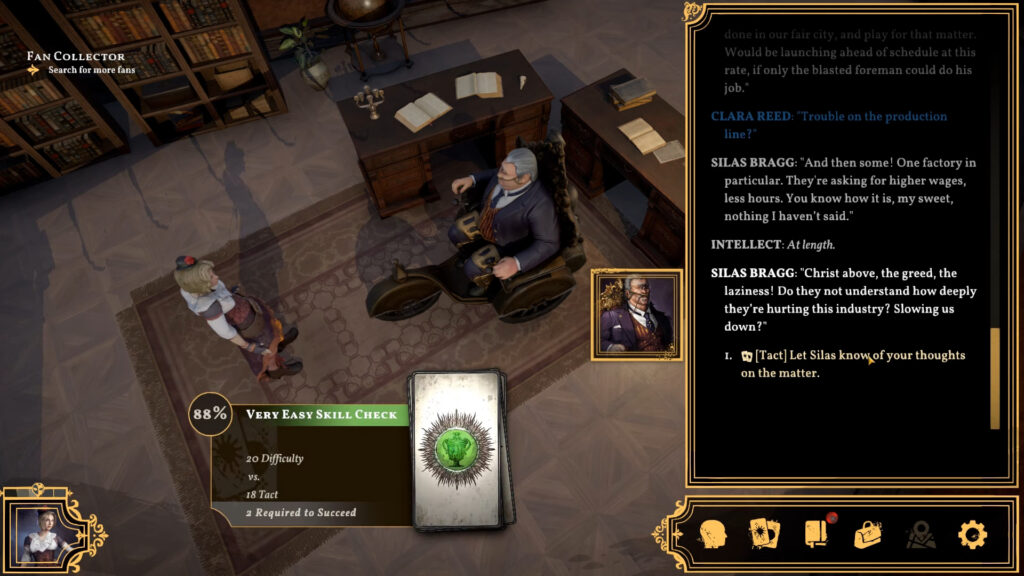
Developer: Crimson Herring Studios
Publisher: Crimson Herring Studios
Platforms: PC
Tested on: PC
Sovereign Syndicate – Review
Placing traditional fantasy races like dwarves, orcs and elves in atypical settings isn’t exactly a new idea, but it’s still a fresh enough concept that we haven’t grown tired of it. The latest game to explore this is Sovereign Syndicate, the debut title from Canadian indie studio Crimson Herring Studios. It’s a title that commands attention with striking key art, and the idea of solving murder mysteries alongside mythical creatures is a surefire way to draw us in. The proof of the pudding is in the eating, however. Can Sovereign Syndicate deliver beyond its initial impressions?
Story
Set in a fantasy-steampunk version of Victorian London, Sovereign Syndicate’s story alternates between three protagonists. There’s the minotaur Atticus Daley, an illusionist suffering from an addiction to alcohol. Then there’s Teddy Redgrave, a dwarven monster hunter and engineer who has built his own steam-powered robot assistant named Otto. Lady-of-the-night turned amateur detective Clara Reed completes our party of misfits. Well, we say party, but most of the time, these characters’ stories are presented as standalone adventures, with the perspective switching between story chapters. Atticus is trying to reunite with his long-lost mother, and this puts him on a path involving missing orphans. Clara’s tale takes inspiration from Jack the Ripper as our sleuth tries to find the mysterious Courtesan Killer. Teddy is also on the hunt for a killer, although his target isn’t shrouded in mystery in the same way Clara’s is. The goals remain the same during your playthrough, but the way the story unfolds differs depending on the choices you make. Sovereign Syndicate is a narrative-driven game first and foremost, and if you’re looking for a cynical, dark, and twisted set of stories, the game will be right up your alley.
Graphics
Most of Sovereign Syndicate’s world-building isn’t done through visuals but through descriptive text. The in-game visuals are presented from a top-down isometric perspective, with relatively basic 3D characters wandering through simple environments. The on-screen versions of alternate London look appropriately grey and dull, which fits with the game’s atmosphere, but we couldn’t help but feel like the visuals were a bit too basic. In fact, the verbose descriptions appearing in the text inadvertently highlight just how underwhelming the visuals are by juxtaposition. Granted, there are a few occasions where there is a glimpse of something more, as the game very rarely presents cutscenes in the form of motion comics but these instances happen too few and too far between.
Sound
Audio-wise, Sovereign Syndicate doesn’t fare much better than it does visually. There is some voice acting here, but this is extremely limited, especially for a game that relies so much on dialogue. The game’s ambient sound effects are basic, and although the soundtrack sets the right mood, it is lacking in variety and not particularly memorable. The one exception to this is a single musical number performed by a character, which elevates itself above what is an otherwise forgettable soundscape.
Gameplay
‘RPG’ has become a bit of an umbrella term, covering a wide variety of sub-genres ranging from fast-paced ARPGs like Nier: Automata to turn-based JRPGs like the Trails series. Sovereign Syndicate belongs to a historically lesser-known RPG subgenre that has seen a rise in popularity thanks to the success of titles like Disco Elysium and Baldur’s Gate 3: the CRPG. The C stands for ‘classic’ here, as CRPGs attempt to emulate classic tabletop RPGs. Granted, you’re using tarot cards in Sovereign Syndicate instead of rolling dice, but the influence of Disco Elysium in particular is unmistakable here. That’s not to say that Sovereign Syndicate feels like a carbon copy of ZA/UM’s masterpiece, but elements like internal monologue and deliberately minimalist combat feel all too familiar, even if Sovereign Syndicate puts its own spin on these. We’re not going to assume that you’ve played Disco Elysium (although you absolutely should), so we’ll avoid any further comparisons and instead look if what Sovereign Syndicate has to offer can stand on its own legs in terms of gameplay.
The story description should have clued you in that you won’t be creating your own characters in Sovereign Syndicate, although you do get somewhat of a choice when it comes to your stats. Your first order of business is to pick a starting profile for each of the three protagonists, from a selection of four. Each profile has a unique trait and offers different dialogue options, which adds some replayability to the game. As you progress through Sovereign Syndicate, the choices you make shape these characters even further. Since Sovereign Syndicate isn’t a combat-driven game, you won’t be grinding for experience points to level up your character, and instead stats and traits are based on decision-making. This then has a direct effect on character personalities. This in turn determines how characters are able to respond in different situations as well as how their internal monologue plays out. You can ‘build’ Atticus as an intimidating character that relies on his sheer size and strength to coerce NPCs into aiding him, for example, or you can instead opt for a more cunning version of the minotaur that is able to outsmart other characters. There is no wrong way to play Sovereign Syndicate, although the knowledge that the very few combat encounters present are choice-driven as well and play out automatically rather than you actually having to fight may affect how you build your characters.
The absence of combat does highlight Sovereign Syndicate’s biggest weakness in terms of gameplay: despite the bleak setting and dark atmosphere, this isn’t a very challenging game. You’ll still need to perform skill checks, through the aforementioned tarot deck, but it’s a simple matter of adding the value of a drawn tarot card to the relevant character trait and comparing this to a target number. However, the consequences of failing a skill check are little to none. At worst, you miss out on optional information, and ultimately, this may affect which of the game’s different endings you get. For as entertaining as Sovereign Syndicate is -and it really is- it more often than not feels like you’re watching things play out based on your choices rather than that you actually feel like you’re making a difference. Things do play out differently, and there are a couple of different endings, but ultimately, the stories hit the same major beats, regardless of what you do. Sovereign Syndicate isn’t a very long game, clocking in at roughly 8-10 hours depending on your choices and reading speed, and it’s worth at least one playthrough. The game heavily hints at a sequel, and while we’re all for that, here’s hoping that choices in a theoretical Sovereign Syndicate 2 feel more consequential.
Conclusion
While there are obvious weak points to Sovereign Syndicate, we still enjoyed our time with the game. The excellent writing and choice-driven character personalities drew us into this world, and we really wanted to see the stories of Atticus, Clara, and Teddy play out. The game’s 8-10 hour runtime is manageable enough that more than one playthrough is feasible too. The game’s lack of challenge and penchant to stick to specific story beats harm Sovereign Syndicate’s overall appeal, as does the audiovisual presentation which doesn’t quite live up to the game’s full potential. Even so, the game left us longing for a potential sequel, which we hope improves on the game’s shortcomings, because this really is a universe worth exploring.









No Comments